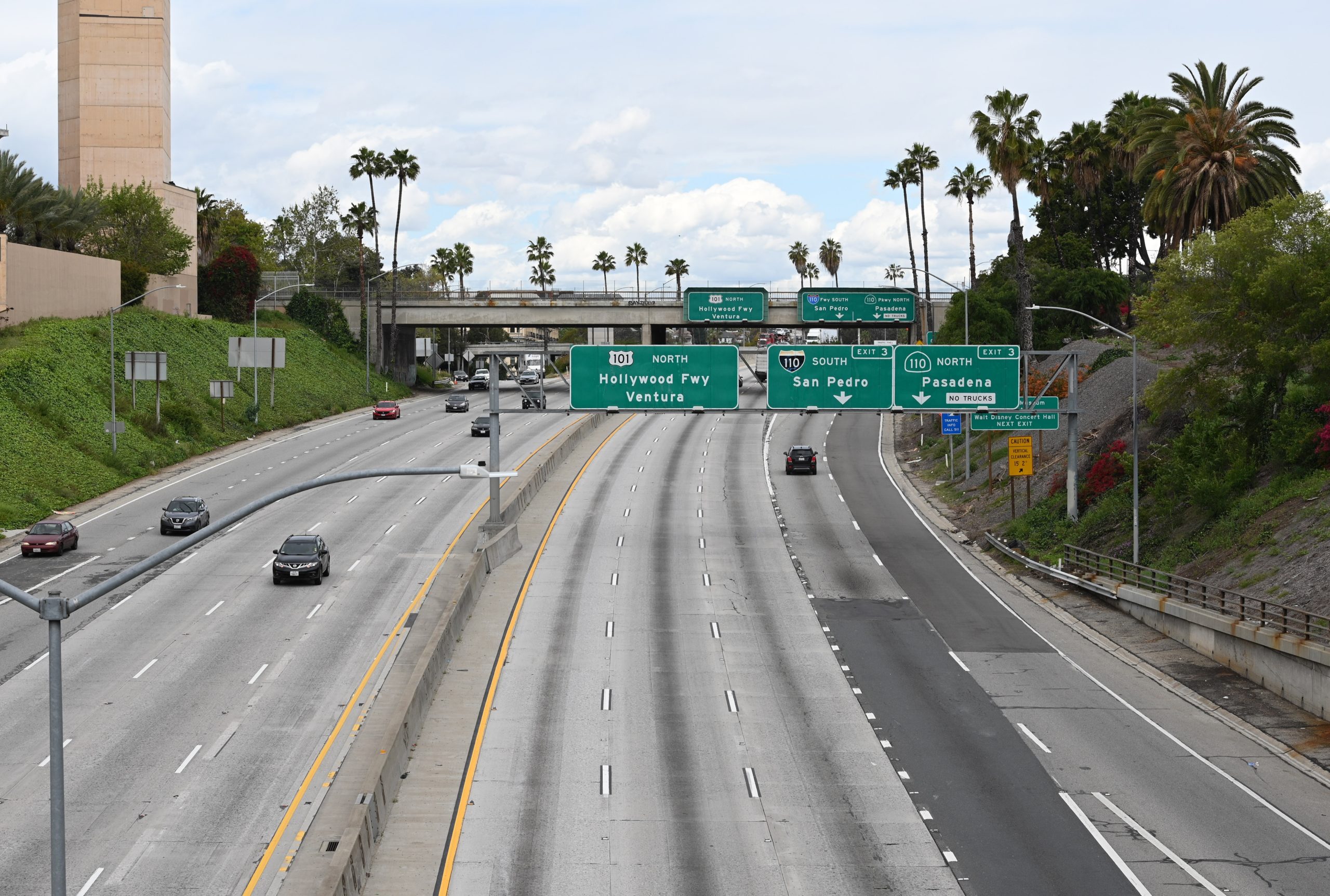Dream vacation US road trips canceled as virus shutters states
The coronavirus pandemic has muted the call of the open road for vactionners, and this Los Angeles highway is seen nearly empty in April 2020 (Robyn Beck)
Los Angeles (AFP) – Parisians Carole de la Cheneliere and Olivier Merleau were all set for their once-in-a-lifetime road trip down America’s famous interstates — but then, the pandemic struck.
This Friday, they were due to arrive in Los Angeles, from where the open road would have carried them up the Pacific coast to San Francisco, back to San Diego, then on a desert loop through the iconic landscapes of the Grand Canyon, Bryce Canyon and Zion national parks.
“Visiting the United States has been on my bucket list for years and this trip was supposed to be a dream vacation to celebrate our 55th birthdays,” said de la Cheneliere, who works at a high-end clothing store in the French capital.
“We had organized everything,” including exchanging currency, buying maps and gathering tips from other road trippers, she said.
The plan was to end in Las Vegas to celebrate their birthdays, which fall within five days of each other.
But the couple had to cancel as museums, casinos, beaches, parks and attractions like Disneyland across the US one by one began to shutter their doors in an effort to stem the spread of the potentially deadly coronavirus.
Hotels and airlines are almost inoperative as the normal tourism high season begins, with no clear reopening dates in sight.
While some states are looking to ease their lockdowns by reopening certain businesses, many tour operators believe they will be the last to recover.
“We’re expendable — we’re tourism,” said Sabra Purdy, 41, who runs a climbing center in California’s Joshua Tree National Park. “Nobody needs us, and we could have an incredibly meager year.”
“There’s really nothing that we can do about that.”
– ‘I wouldn’t go’ –
Sites like the Grand Canyon drew almost six million visitors a year before they were closed due to the pandemic.
But even if state governors lift restrictions, tourism needs another key factor to return: confidence.
“Until there’s some kind of feeling of safety among the public, where they feel safe going to a buffet or a show or a tour, it doesn’t matter if we’re open or not,” said Matthew Meier, 38, whose tour company runs trips in Las Vegas and the nearby Grand Canyon.
“I wouldn’t go right now… if the casinos open tomorrow, I’m not taking my family down there. And I’m sure a lot of people feel the same way,” he added.
Some 80 million people visit the US from around the world each year. Tourism accounts for nearly $2 trillion (2.8 percent of GDP) and generated 7.8 million jobs in 2018.
Both Meier and Purdy have had to lay off staff as stay-at-home orders and international travel bans caused a flood of cancellations that essentially wiped out their peak season.
Customers from Asia were the first to cancel, Meier recalled. Asians represented 40 percent of his clientele, with another 20 percent originating from virus-hit Europe.
– ‘Not worth our lives’ –
Not everyone is mourning the tourists’ absence, however.
Even before authorities in northwestern Washington state — an early coronavirus hotspot — imposed a containment order, Tiffany Turner had already closed her hotels at Long Beach resort, 200 miles south of Seattle.
It was spring vacation season, and swarms of holidaymakers from out of town were already striking fear among residents.
“It was less people than it would normally be, but it definitely scared the community,” said Turner.
Angrily worded flyers began appearing on visitors’ car windshields.
“Your vacation is not worth our lives,” declared one, in black capital letters.
“The Long Beach Peninsula has only one ventilator. Do you really want to test those odds?” asked another.
Mayor Jerry Phillips said the campaign was a “gut response” caused by frustration in a community with a lot of elderly and at-risk people.
“They get worried because they see people coming here from other parts of states, from other countries and stuff,” he told AFP. “And they’re afraid (the virus) is going to come in and infiltrate the city.”
Turner is ready to reopen her hotels, but said does not want the restrictions lifted too soon.
“The worst thing for small businesses and for our community is having to do this all over,” she said.
Back in Paris, de la Cheneliere is still enviously checking the California weather, and dreaming of hitting the road.
“We haven’t given up,” she said. “Maybe we can make it at Christmas.”
Disclaimer: Validity of the above story is for 7 Days from original date of publishing. Source: AFP.


